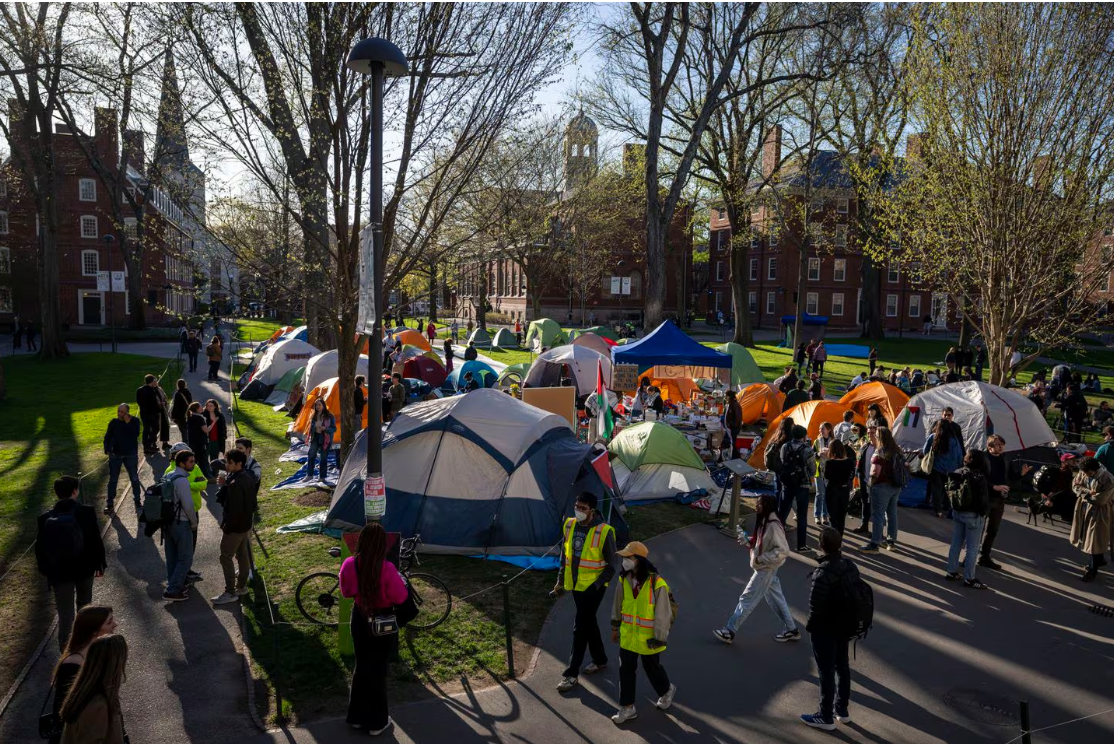哈佛大学董事会否决了教师的决定,禁止参加亲巴勒斯坦营地的 13 名学生获得学位

【中美创新时报2024 年 5 月 22 日编译讯】(记者温友平编译)周三(22日),哈佛大学最高管理委员会拒绝了教师的建议——允许参加哈佛校园为期三周露营的13 名亲巴勒斯坦学生与同学一起获得学位。受影响的学生将能够参加周四的毕业典礼,但不会获得文凭,从而危及毕业后计划。《波士顿环球报》记者希拉里·伯恩斯(Hilary Burns)对此作了下述报道。
两天前,哈佛大学文理学院的一些成员投票决定向这 13 名学生授予学位,而该校正为本学年最重要的日子之一的盛况和情况做准备。在此之前,全国大学校园就对建立营地抗议以色列-哈马斯战争的亲巴勒斯坦示威者进行适当制裁展开了激烈辩论。
周三的决定震惊了教职员工,他们强烈认为学生抗议者受到了不公平的惩罚,这很大程度上是因为大学领导人面临的政治压力。
“我很沮丧,”政府学教授瑞安·伊诺斯说。“这纯粹是公司的狂妄自大。一群亿万富翁每年访问剑桥几次,可以告诉教育这些学生的教授,他们比那些值得获得学位的人更了解——这种大胆令人惊叹。我认为公司不配领导大学。”
哈佛公司在一份解释其决定的声明中引用了哈佛学院手册,其中称“不会向信誉不佳或正在接受行政委员会、荣誉委员会或另一所学校纪律委员会的纪律指控的学生授予学位。”
相关学生要么处于留校察看状态,要么被停学。哈佛大学没有提供纪律处分或学生涉嫌行为的详细信息,并表示无法对个别案件发表评论。
该公司面临来自支持以色列的保守派政客、捐助者、学生和校友的压力,要求他们表明抗议者在营地期间一再无视纪律警告,将面临严重后果。
每个学期,文理学院都会举行一次形式投票,以批准应届毕业生名单,会议通常是一场沉闷的会议,很少有投票成员参加。
然而,据哈佛大学称,周一,文理学院大约 900 名教职人员中,有 115 名教职人员出席了会议,议程中还增加了一项修正案,向 13 名本科生授予学位,这些人上周得知他们将被禁止参加 由于参加了营地活动,他们在毕业时获得了毕业证书。该措施以口头投票方式获得批准。
哈佛大学主要的亲巴勒斯坦学生团体对该公司的决定提出了批评。哈佛脱离被占领巴勒斯坦联盟在一份声明中表示:“今天的行动使该大学进一步陷入合法性和治理危机,这将在未来几个月和几年内对哈佛产生重大影响。”
星期三晚上,哈佛一年一度的班级日仪式结束后,管理机构的举动也在校园内引起了共鸣。
“缺乏问责制令人愤怒,”即将毕业的高年级学生杰里米·奥恩斯坦(Jeremy Ornstein)在课堂日发言时说道。奥恩斯坦表示,学生群体存在分歧,并补充说,以色列-巴勒斯坦冲突“各方都感到痛苦”。
在哈佛大学任教 59 年的经济学教授斯蒂芬·马格林 (Stephen Marglin) 称,该公司的决定是对教师的“一记耳光”,并可能在周四的毕业典礼上引发抗议。
他不支持亲巴勒斯坦抗议活动,因为他们没有承认10月7日哈马斯领导的对以色列的袭击,这场袭击造成1,200人死亡,并扣押了250人质,其激烈程度与“内塔尼亚胡政府报复的暴行”相同。
不过,他认为这种纪律在阻止学生获得学位方面太过分了。马格林说,这个营地有 30 到 40 个帐篷,“完全在哈佛过去容忍的范围之内”。
在该公司周三做出决定后不久,负责 10 月份首次抵达哈佛广场广告牌卡车的保守派媒体公司 Accuracy in Media 表示,将向毕业典礼发送另一个“移动广告牌”,广告牌上印有学生抗议者的照片和个人信息。 揭露“在校园内从事反犹太主义活动或使用反犹太主义言论的学生”。
剑桥倡导裁军的非营利组织马萨诸塞州和平行动表示,将在毕业典礼外举行“为加沙举行庄严守夜活动”。
亲巴勒斯坦的学生抗议者上周对一些学生可能被阻止毕业表示震惊,因为他们拆除了营地,根据他们对与临时校长艾伦·加伯的沟通的理解,高年级学生将被允许在本学期毕业 。
加伯在 5 月 14 日发给学生抗议者的电子邮件中表示,哈佛大学将“鼓励”学校根据现有先例和惯例(包括在相关情况下考虑自愿离开营地的决定)迅速处理案件,为所有学生,包括那些 此后有资格毕业的学生,以便他们可以这样做。”
哈佛大学发言人乔纳森·斯温周日表示,加伯无权处理学生纪律问题,这些问题属于大学内各个学院的职权范围。然而,加伯在给哈佛犹太校友联盟的一封信中表示,他“强烈支持对那些被发现违反大学政策的人采取适当的纪律处分。”
参加周一教师会议的几名教职人员表示,他们认为哈佛应该坚持他们认为加伯与学生达成的协议的本质,以说服他们拆除营地。
“他在与学生的交流中尽可能明确地表示,他敦促宽大处理,”政府学教授史蒂夫·莱维茨基(Steve Levitsky)在谈到加伯时说道。“然后[管理]委员会突然明显违反了交易条款。”
该委员会负责本科生纪律,由管理人员和讲师组成,上周对 13 名高年级学生进行了处罚。周三,哈佛大学公司确认了这一决定。
行政委员会由哈佛大学院长拉克什·库拉纳 (Rakesh Khurana) 监督。在周一的会议上投票的几名教员表示,他们认为一些董事会成员应该回避与营地相关的 13 起纪律案件,因为他们还负责识别营地抗议者的身份并拍摄照片和视频,而哈佛大学要求他们这样做。但抗议者认为,鉴于自 10 月 7 日以来许多抗议者遭到人肉搜索,这种做法是违法的。
加伯在 5 月 6 日发给社区的电子邮件中表示,当哈佛员工“要求出示身份证件以执行我们的政策”时,他们遭到了抗议者的吼叫和包围。
加伯写道,“我们还收到报告称,路人遭到抗议者的对抗、监视和跟踪”。“这种行为是站不住脚的,也是不可接受的。”
一些教职员工对这些报告提出质疑。四月份学生在哥伦比亚大学被捕后,哈佛大学向公众和媒体关闭了大门。
该公司周三表示,它还认为“对信誉不佳的特定学生群体免于遵守既定规则”是不公平的。受影响的学生现在可以经历快速审查和上诉流程。目前尚不清楚上诉程序需要多长时间。
迄今为止,哈佛大学和麻省理工学院是马萨诸塞州唯一因学生参与而采取行动阻止学生本学期毕业的学校。加伯表示哈佛大学不会考虑从以色列撤资。
哈佛大学管理人员此前通过电子邮件和校园标牌告诉学生,“未经授权搭建建筑物、帐篷和桌子是违反大学规定的”,并补充说,扰乱正常活动的学生将面临纪律处分。
哈佛社区的许多人希望看到学生抗议者被追究责任。心理学教授史蒂文·平克(Steven Pinker)称周一的教师投票“不幸”。
平克说:“没有一致的政策允许学生单方面征用大学公共空间,并出于大学社区许多其他成员反对的政治原因扰乱其运作。” “如果没有制裁,就无法实施连贯的政策。大学应该鼓励辩论和深思熟虑,而不是强迫接管和威胁。”
记者 Alexa Coultoff 对本报告做出了贡献。
题图:营地在哈佛庭院停留了三周。BEN CURTIS/美联社
附原英文报道:
Harvard’s governing board overrules faculty, bars 13 students who participated in pro-Palestinian encampment from receiving degrees
By Hilary Burns Globe Staff,Updated May 22, 2024
CAMBRIDGE — Harvard University’s top governing board on Wednesday rejected the recommendation of faculty to allow 13 pro-Palestinian students who participated in a three-week encampment in Harvard Yard to receive their degrees with their classmates.
Impacted students will be able to participate in commencement ceremonies Thursday but will not receive diplomas, jeopardizing post-graduation plans.
The announcement came two days after some members of Harvard’s Faculty of Arts and Sciences voted to grant degrees to the 13 students and as the university prepared for the pomp and circumstance of one of the most important days of the academic year. And it follows a fierce debate on college campuses nationwide over the appropriate sanctions for pro-Palestinian demonstrators who set up encampments to protest the Israel-Hamas war.
The decision Wednesday shocked faculty who feel strongly that student protesters are being unfairly punished, largely because of political pressure on university leaders.
“I’m upset,” said Ryan Enos, a professor of government. “This was pure hubris by the Corporation. To think a bunch of billionaires that visit Cambridge a couple times a year could tell the professors who educate these students that they know better than them who deserves to earn degrees — the audacity is breathtaking. In my opinion, the Corporation is not worthy of leading the university.”
The Harvard Corporation, in a statement explaining its decision, cited the Harvard College handbook, which says that a “degree will not be granted to a student who is not in good standing or against whom a disciplinary charge is pending with the Administrative Board, the Honor Council, or the disciplinary board of another school.”
The students in question are either on probation or suspended. Harvard has not provided a breakdown of the disciplinary actions or what thestudents had allegedly done, saying it cannot comment on individual cases.
The Corporation has faced pressure from conservative politicians, donors, students, and alumni who support Israel to show that the protesters, who repeatedly ignored disciplinary warnings during their encampment, will face serious consequences.
Each semester, the Faculty of Arts and Sciences holds a pro forma vote to approve the list of graduating seniors in what is usually a sleepy meeting that few voting members attend.
On Monday, however, 115 faculty members among the roughly 900 in the Faculty of Arts and Sciences attended, according to Harvard, and an amendment was added to the agenda to grant degrees to 13 undergraduate seniors who learned last week that they would be prevented from receiving their diplomas at graduation because of their participation in the encampment. The measure was approved on a voice vote.
The main pro-Palestinian student group at Harvard assailed the Corporation’s decision. “Today’s actions have plunged the university even further into a crisis of legitimacy and governance, which will have major repercussions for Harvard in the coming months and years,” the Harvard Out of Occupied Palestine coalition said in a statement.
The governing body’s move also resonated Wednesday evening on campus following Harvard’s annual Class Day ceremonies.
“The lack of accountability is infuriating,” said graduating senior Jeremy Ornstein, who spoke during Class Day. Ornstein said the student body is divided and added “people feel pain on all sides” of the Israeli-Palestinian conflict.
Stephen Marglin, a professor of economics who has taught at Harvard for 59 years, called the Corporation’s decision “a slap in the face” to faculty and likely to prompt protests at graduation Thursday.
He does not support the pro-Palestinian protests because they have not acknowledged the Oct. 7 Hamas-led attack on Israel that killed 1,200 and took 250 hostage with the same fervor as the “atrocity of the retaliation by the Netanyahu government.”
Still, he thinks the discipline went too far in preventing students from receiving degrees. The encampment, which included 30-40 tents, was “well within the bounds of what Harvard has tolerated in the past,” Marglin said.
Shortly after the Corporation’s decision Wednesday, Accuracy in Media, the conservative media company responsible for the billboard trucks that first arrived in Harvard Square in October, featuring student protesters’ photos and personal information, said it was sending another “mobile billboard” to commencement to expose “students who have engaged in antisemitic activities or used antisemitic rhetoric on campus.”
Massachusetts Peace Action, a nonprofit in Cambridge that advocates for disarmament, said it will hold a “solemn vigil for Gaza” outside the graduation.
Pro-Palestinian student protesters expressed shock last week that some students could be prevented from graduating, after they had dismantled their encampment with the understanding — based on their interpretation of their communications with interim president Alan Garber — that seniors would be allowed to graduate this semester.
In a May 14 email to student protesters, Garber said Harvard would “encourage” the “schools to address cases expeditiously under existing precedent and practice (including taking into account where relevant the voluntary decision to leave the encampment), for all students, including those students eligible thereafter to graduate so that they may do so.”
Harvard spokesperson Jonathan Swain said Sunday that Garber doesn’t have authority over student disciplinary matters, which are under the purview of individual schools within the university. However, in a letter to the Harvard Jewish Alumni Alliance, Garber said he “strongly supports appropriate disciplinary action for those found to have violated university policies.”
Several faculty members who attended Monday’s faculty meeting said they felt Harvard should uphold the essence of the deal they believe Garber made with students to persuade them to take down the encampment.
“He was as clear as he could possibly be in his communication to students that he was urging leniency,” Steve Levitsky, professor of government, said of Garber. “And then suddenly the [Administrative] Board clearly violates the terms of the deal.”
The board, which is responsible for undergraduate discipline and made up of administrators and instructors, doled out the punishment for the 13 seniors last week. That decision was affirmed by the Harvard Corporation on Wednesday.
The Administrative Board is overseen by Harvard College dean Rakesh Khurana. Several faculty members who voted in Monday’s meeting said they believe some board members should have recused themselves from the 13 disciplinary cases related to the encampment because they were also responsible for identifying and taking photos and videos of protesters at the encampment, which Harvard asked them to do. But protesters felt that was violating given many protesters have been doxxed since Oct. 7.
Garber said in a May 6 email to the community that Harvard staffers were yelled at and encircled by protesters when the employees “requested to see IDs in order to enforce our policies.”
“We have also received reports that passers-by have been confronted, surveilled, and followed” by protesters, Garber wrote. “Such actions are indefensible and unacceptable.”
Some faculty members questioned those reports. Harvard closed its gates to the public and to media after students were arrested at Columbia University in April.
The Corporation said Wednesday that it also considered the unfairness “of exempting a particular group of students who are not in good standing from established rules.” Impacted students can now go through an expedited review and appeal process. It is unclear how long the appeal process could take.
Harvard and MIT are so far the only schools in Massachusetts that have moved to prevent students from graduating this semester because of their involvement. Garber has indicated Harvard will not consider divestment from Israel.
Harvard administrators previously told students in emails and through campus signage that “erecting structures, tents, and tables without authorization is a violation” of university rules, adding that students who disrupted normal activities would face disciplinary consequences.
Many within the Harvard community want to see the student protesters held accountable. Steven Pinker, a psychology professor, called the faculty vote on Monday “unfortunate.”
”There’s no coherent policy that would allow students to unilaterally expropriate the university commons and disrupt its functioning for a political cause that many other members of the university community oppose,” Pinker said. “And without sanctions, there’s no way to implement a coherent policy. Universities should encourage debate and deliberation, not forced takeovers and threats.”
Correspondent Alexa Coultoff contributed to this report.

